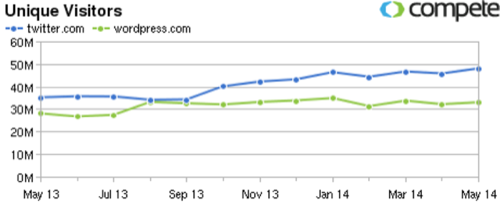After recent comScore data showed Twitter stats leveling off as WordPress traffic continued to grow, some bloggers framed the results as an either/or proposition; if one platforms wins, the other loses.

WordPress founder Matt Mullenweg has weighed in on the subject, stating that the interaction between microblogging and what he’s calling “megablogging” is hardly a zero-sum game. “It’s not really a ‘versus,’ it’s an ‘and’,” he wrote.
“One of the many uses of Twitter is to link to and promote your blog posts (and other people’s blog posts,)” he continued. “As we grow, so do they, and vice versa.”
Here’s a chart showing data similar to comScore’s:

As you can see, Twitter.com’s growth rate for unique site visitors is slowing, while WordPress.com’s site stats continue to grow. Does this signal the supposed “death of blogging” trend is coming to an end? Mullenweg certainly doesn’t think so.
He notes that because the question is more one of cooperation than competition, the folks at WordPress are actually trying to create more opportunities for overlap between various platforms. “Features like WP.me, post by email, Twitter publicize, RSS Cloud, P2, email subscriptions, and more stuff in the cooker is trying to tie these things together more because people who do one are highly likely to do another,” he said.
Moreover, many readers would question the validity of data for Twitter.com, since the website is, for many users, a secondary or even tertiary method of accessing the service. Between mobile and desktop apps, stats for Twitter.com really don’t reflect how many people are using the service.
Should comScore and other domain statistics analyses be thrown out of these conversations? ‘I would say they probably are precise but not accurate,” wrote Mullenweg. “For WordPress.com, they don’t count the custom domains or RSS readers; and for Twitter they don’t count API usage or desktop clients.”
Ultimately, comScore data are one way to compare site traffic, but in the age of APIs, they’re hardly useful for tracking the actual number of active users for a particular service.
So, we’re curious to know, do you blog, tweet, or both? And are you more likely to use Twitter.com or a mobile or desktop application? Let us know, and give us your feedback in the comments.





















